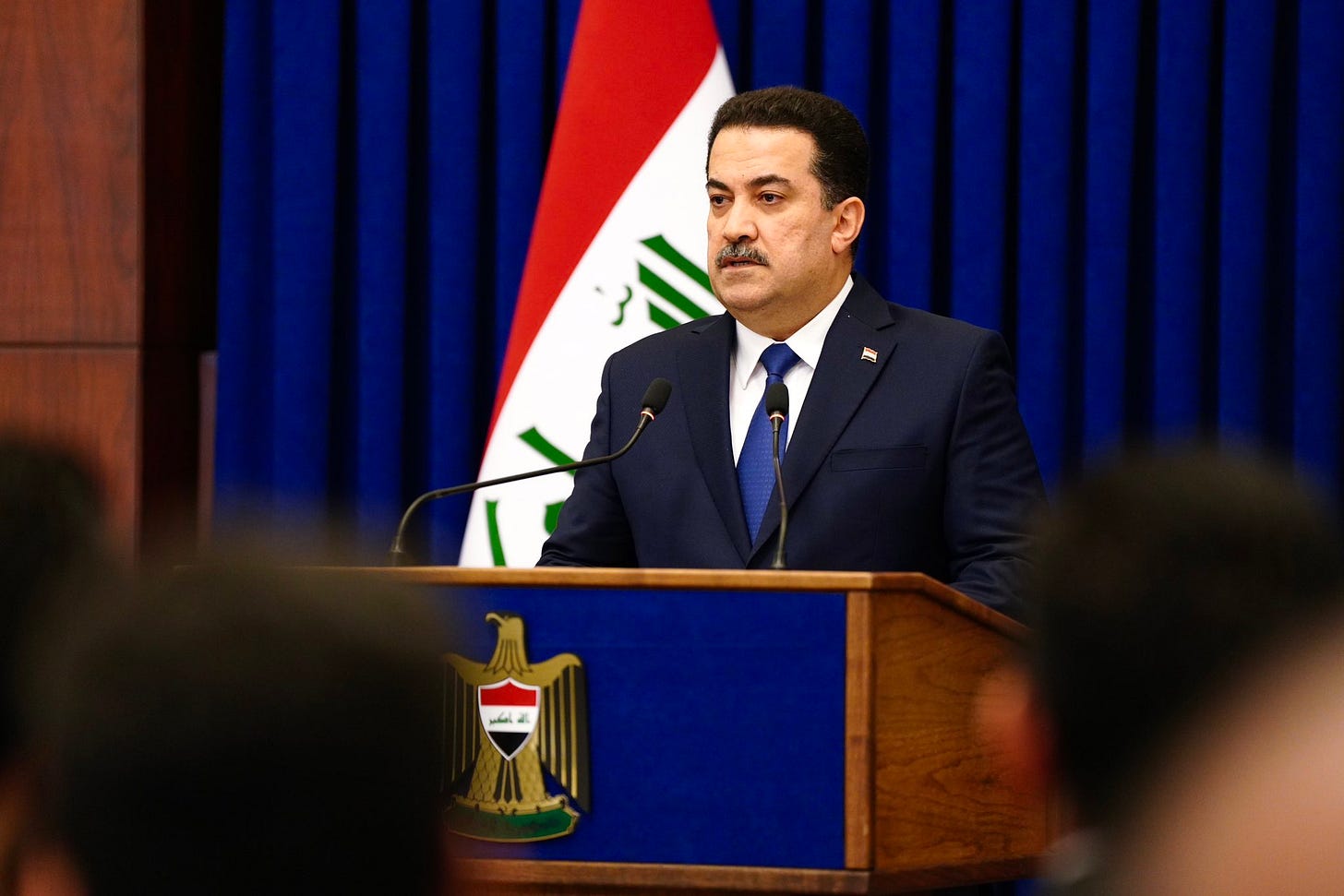Sudani assembles patchwork coalition in bid for second term
Tuesday’s announcement of Prime Minister Sudani’s new electoral coalition, the Construction and Development Alliance, marks a pivotal moment in Iraq’s pre-election landscape. But the alliance offers little ideological or even policy-oriented coherence.
Rather than a coalition built on a shared vision or political identity that distinguishes it from its competitors, the Construction and Development Alliance resembles a transactional vehicle aimed at electoral arithmetic: a collection of disparate figures and micro-parties united by little more than political opportunism and proximity to state resources.
The coalition brings together staunch secularists with Iran-aligned Islamists and tribal elders. Below is an overview of the seven entities that have joined forces:
Tayyar al-Furatayn
This is Sudani’s own party and serves as the nominal anchor, but it is a weak one. In the 2021 parliamentary election, it won just under 40,000 votes nationwide and secured a single parliamentary seat, before adding another due to the Sadrist withdrawal. The party lacks a clear political base beyond Sudani himself, although it may have attracted a greater number of cadres since Sudani took office. If Sudani personally runs in Baghdad, he will likely amass upwards of 200,000 votes, which under the proportional representation system will translate into several seats for his list.
Ajyal Gathering
Led by Muhammad Al-Sayhood, a senior member of the Sudani tribal clan and longtime ally of Nouri Al-Maliki. Sayhood ran as a State of Law candidate in 2021 and came first in his electoral district in Baghdad with 5,800 votes. Sudani ran in the same district and came second with 5,300 votes. Sayhood has a base built on tribal loyalty rather than national appeal, and his defection from State of Law to Sudani's camp reinforces this approach.
Wataniya Coalition
A largely defunct brand led by former Prime Minister Ayad Allawi, Wataniya did not win any seats in 2021, having garnered a modest 29,000 votes, and sat out the 2023 provincial council elections altogether. Its inclusion appears driven by a desire to revive Allawi’s waning legacy through his daughter Sara, who was appointed as a civil society advisor in Sudani’s office last year. She ran for parliament in 2021 but failed to win a seat in Baghdad with 2,600 votes. Wataniya has long sought to coopt the protest-oriented Tishreen base with their staunchly secular brand of politics, but Allawi’s most recent attempt to resuscitate his political career in February by launching the cross-sectarian National Civil Assembly has failed, with key partners including the Sunni politician Salih Al-Mutlak opting not to join Sudani’s coalition.
National Solutions Gathering
Headed by Mohammed Sahib Al-Daraji, who is emblematic of Iraq’s political shape-shifting class. A former Sadrist turned Iran-aligned Fatah affiliate turned political independent, Daraji has held a number of advisory positions in the current government by virtue of his personal friendship with the prime minister. His last party, called Professionals for Construction, garnered 50,000 votes in 2021 but he himself failed to secure a seat.
Karbala Creativity Alliance
Led by Karbala’s governor Nasif Al-Khattabi, this is a significant addition to Sudani’s coalition. Khattabi’s electoral success in the 2023 provincial elections where his party won 7 of 13 seats is a major win for Sudani, particularly given that Karbala has long been a stronghold of his archrival Nouri Al-Maliki. This is all the more notable because Khattabi previously had longstanding ties to the State of Law coalition.
Aqd Al-Watani
Falih Al-Fayyadh’s decision to join forces with Sudani is the least surprising given their close working relationship during this government. As chairman of the Popular Mobilization Commission (PMC), Fayyadh has maintained his position with Sudani’s backing, despite heavy pressure from other prominent Shia forces who have called for him to be replaced. Aqd Al-Watani performed well in 2021 in terms of vote share, coming tenth overall with a total of 236,000 votes, but this only translated to a modest 4 seats in parliament due to tactical errors in how candidates were fielded.
But Fayyadh’s ties to Iran remain strong, and if Tehran signals a shift, there is no guarantee he will remain in Sudani’s camp after the election. His appeal in Sunni-majority areas like Ninewa, through cooperation with the Iraqi Islamic Party, makes him electorally valuable but politically unreliable.
Bilad Sumer Gathering
Ahmed Al-Asadi is is a former Fatah stalwart and current Minister of Labor and Social Affairs. Bilad Sumer appears to be an expanded version of his old party, Sanad, which brought him 10,700 personal votes in 2021 when he ran in Baghdad. But Asadi still commands personal ambition and there were suggestions last month that his alliance with Sudani had fallen apart over the latter’s unannounced visit to Doha to meet the Syrian president. There is no indication that Asadi’s desire to become prime minister has been subordinated. On the contrary, his alignment with Sudani may be temporary and tactical, possibly a stepping stone rather than a pledge of loyalty.
Overall, the Construction and Development Alliance is a patchwork grouping of disparate electoral lists that have come together for the sake of vote maximization. The lack of ideological coherence or unifying political identity suggests a fragile alliance that could quickly unravel post-election.
Sudani will likely perform well in Baghdad, where his control over state resources and incumbency will help consolidate seats into double digits. But beyond the capital, his coalition lacks a compelling and coherent narrative that would give it reach across the provincial heartlands.


